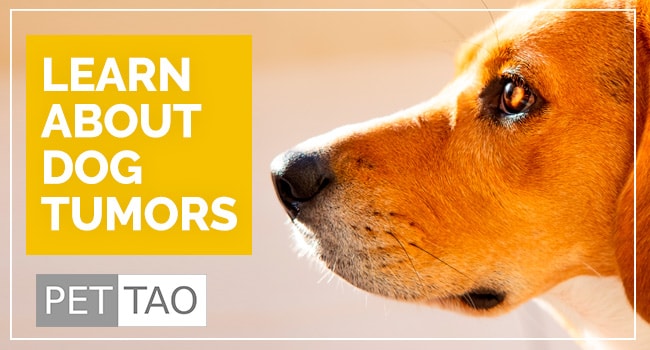Not All Canine Tumors are Cancer
Dog tumors occur all the time.
In fact, there’s a 50/50 chance that your dog will develop a tumor of some type during his or her lifetime.
Seeing a tumor on your dog can be a very scary experience.
What is it?
Is it dog CANCER?
Of course, it is very important to have all lumps and bumps on your dog checked by your vet to make sure it’s not a dangerous tumor.
The good news is, roughly 80-90% of tumors are benign, non-invasive tumors and will not spread.
So, what exactly is a dog tumor?
Any lump, growth, or swelling on our dog is defined as a tumor.
Tumors exist in many different types, and dog tumors have many different causes.
Different Types of Dog Tumors
Tumors can be cancerous or noncancerous.
Benign tumors are non-invasive and do not spread.
Benign tumors are noncancerous
Malignant tumors spread and destroy surrounding tissues.
Malignant tumors are cancerous.
Skin Tumors
Skin tumors are the most common type of tumor and makeup almost 50% of the tumors found in dogs.
Skin tumors can be cancerous or non-cancerous.
Lipomas
A lipoma is a benign tumor, often called a “fatty tumor”.
Lipomas are basically conglomerations of fat just below the skin.
Lipomas are not painful and usually are not removed unless they are located in a place where they impede the dog’s movement in some way.
Cysts
Cysts are noncancerous swellings caused by blocked hair follicles.
Basal Cell Tumors
Basal cell tumors look similar to “moles” that humans get. They are usually raised, hairless, and reddish in color.
Basal cell tumors are possibly malignant, but benign roughly 90% of the time.
Unfortunately, if malignant, basal cell tumors can spread to major organs and become fatal.
Mast Cell Tumors
Mast Cell tumors are the most serious that develop in dogs. These tumors often first appear as bumps under the skin.
Because Mast Cell tumors often look and feel like lipomas, they are often overlooked during an examination.
Mast Cell tumors are also very difficult to remove completely because they spread both locally and to internal organs.
Mast Cell tumors often invade the spleen, bone, liver and lymph nodes. If left untreated, Mast Cell tumors are often fatal.
Internal Cancer Tumors
Internal cancer is common in dogs just like in humans.
Dogs can develop mast cell tumors, stomach cancer, liver cancer, and practically any type of cancer heard of in humans.
Some other serious types of cancers afflicting dogs are breast cancer, throat cancer, lung cancer, testicular cancer, and bone cancer.
Looking for other ways to improve your dog’s health through traditional or alternative methods?
Powerful Tools for Overcoming Dog Cancer
You might not be aware, but many cancer-fighting tools are easy to get and use at home.
To realize your true cancer-fighting potential:
- Learn more about dog cancer.
- Ease your dog’s discomfort naturally. PET | TAO’s Comfort is a blend of Eastern herbs and Western supplements to soothe your dog’s arthritic challenges to make him/her more comfortable.
- Boost your dog’s immune system with medicinal mushrooms. PET | TAO’s Complement Immune Mushroom Blend blends together the most powerful immune-boosting medicinal mushrooms on the market in a single product.
- Ease your dog’s stomach upset naturally. Many dogs with cancer suffer stomach upset as well. PET | TAO’s Harmonize GI naturally provides all the digestive enzymes and probiotics your dog needs for optimum gut health.
- Try PET | TAO Freeze Dried Beef Liver Treats. According to TCVM, liver controls tendons and ligaments. As few as 5-6 treats per day can make a huge difference in your dog’s tendon and ligament health!
- Try a Blood-building TCVM Diet. According to TCVM theory, dogs suffering from cancer also often suffer from Blood deficiency. Blood deficiency may due to chemotherapy the cancer itself. PET | TAO Zing dog food builds Blood.
- Learn more about TCVM Herbal Remedies. Chinese medicine offers many amazing natural solutions for dog cancer challenges and palliative care. Some good examples are:








